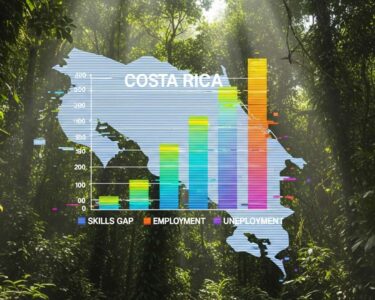San José, Costa Rica — Costa Rica’s Constitution, adopted on November 7, 1949, stands as a testament to the nation’s unwavering commitment to democratic principles, human rights, and the well-being of its people. This comprehensive document serves as the bedrock of Costa Rican society, outlining the fundamental values that guide the nation’s legal and political landscape.
From its very first article, the Constitution proclaims Costa Rica a democratic, free, independent, multiethnic, and multicultural republic. This recognition of diversity and equality before the law forms the basis of an inclusive society where the sovereignty resides exclusively with the nation, emphasizing the crucial role of citizen participation. The Constitution meticulously outlines a wide spectrum of individual and social rights, including the sanctity of life, the inviolability of the home and communications, freedom of expression, and the right to assemble. It further establishes key social rights such as access to a healthy environment, family protection, and the right to work and earn a living wage.
To provide further legal context on the Costa Rican Constitution, TicosLand.com spoke with Lic. Larry Hans Arroyo Vargas, an attorney at law at Bufete de Costa Rica.
The Costa Rican Constitution, adopted in 1949, is a living document that reflects the nation’s commitment to democratic values, social justice, and environmental protection. It guarantees fundamental rights like education, healthcare, and a healthy environment, while also establishing a framework for a stable and transparent government. Amendments over the years have further strengthened these protections, showcasing Costa Rica’s ongoing dedication to evolving with the needs of its people while upholding core principles. This commitment to continuous improvement is what sets the Constitution apart and contributes significantly to Costa Rica’s reputation as a peaceful and progressive nation.
Lic. Larry Hans Arroyo Vargas, Attorney at Law, Bufete de Costa Rica
Lic. Arroyo Vargas eloquently captures the essence of the Costa Rican Constitution as a dynamic instrument of progress. Its adaptability, combined with its unwavering commitment to core values, truly distinguishes it. This ongoing evolution, reflecting the collective will of the Costa Rican people, reinforces the nation’s dedication to a brighter future. We thank Lic. Larry Hans Arroyo Vargas for providing his invaluable perspective on this crucial aspect of Costa Rican identity.
Education and culture are also given significant prominence within the Constitution. The state is entrusted with the responsibility of promoting education at all levels, from preschool to university, and providing food and clothing to indigent students. Furthermore, the Constitution guarantees universal suffrage, enabling all citizens over eighteen to elect their representatives under the watchful eye of the independent Supreme Elections Tribunal.
The separation of powers, a hallmark of democratic governance, is enshrined in the Constitution, dividing governmental authority among the legislative, executive, and judicial branches. This system of checks and balances prevents any one branch from wielding excessive power and ensures respect for citizens’ fundamental rights and freedoms. Beyond its legal significance, the Constitution reflects the aspirations of a nation dedicated to democracy, justice, and the welfare of its people. It serves as an invitation to all citizens to understand and uphold this vital document, which underpins Costa Rica’s peaceful and orderly coexistence.
The Constitution also establishes the framework for economic activity, prohibiting private monopolies and actions that threaten free trade, agriculture, and industry. It highlights the importance of consumer protection and recognizes the rights of workers, including the right to unionize, strike, and receive a minimum wage. The document also emphasizes the state’s role in social welfare, promoting the construction of affordable housing, providing social security, and protecting the rights of mothers, children, the elderly, and people with disabilities.
Furthermore, the Constitution addresses religious freedom, recognizing Catholicism as the state religion while guaranteeing the free exercise of other beliefs that do not contradict universal morality and good customs. It declares Spanish as the official language, while also committing to the preservation and promotion of indigenous languages.
The Constitution’s provisions regarding amendments highlight the delicate balance between stability and adaptability. Partial amendments can be proposed by legislators or citizens, requiring two-thirds approval from the Legislative Assembly and potentially a referendum. General reforms, however, necessitate the convocation of a Constituent Assembly. This process ensures that any changes to the fundamental law reflect the considered will of the Costa Rican people.
The Constitution is not merely a static document; it is a living testament to the values of a nation. It has been amended over time to reflect evolving social values and address contemporary challenges. It serves as a guide for legislation, judicial interpretation, and government action, ensuring that the principles of democracy, justice, and human rights remain at the forefront of Costa Rican society. Through its provisions and the values it embodies, the Costa Rican Constitution continues to shape the nation’s present and future, offering a framework for progress, stability, and a commitment to the common good.
For further information, visit bufetedecostarica.com
About Bufete de Costa Rica:
Bufete de Costa Rica is a law firm dedicated to providing high-quality legal counsel, deeply committed to the principles and values enshrined in the Costa Rican Constitution. They offer a range of legal services, guided by the commitment to upholding the rights and freedoms guaranteed by the Constitution. Their expertise spans various areas of law, ensuring that clients receive comprehensive and effective legal representation.
For further information, visit the nearest office of Supreme Elections Tribunal
About Supreme Elections Tribunal:
The Supreme Elections Tribunal is an independent body responsible for organizing, directing, and overseeing elections in Costa Rica. It plays a crucial role in safeguarding the integrity of the electoral process, ensuring free, fair, and transparent elections. Its independence from the other branches of government reinforces its commitment to impartiality and democratic principles.









